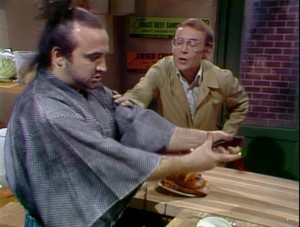Imagine you’re the head of a US fast-food chain in Japan that has been scandalized by a tooth-in-french-fries disaster. How do you repair the damage? Bow deeply — and be convincing.
 So it was for Sarah Casanova, the Canadian president of McDonald’s Japan, whose less-than-textbook corporate mea culpa this month was an attempt at the tightly choreographed script routinely used by crisis-hit organisations.
So it was for Sarah Casanova, the Canadian president of McDonald’s Japan, whose less-than-textbook corporate mea culpa this month was an attempt at the tightly choreographed script routinely used by crisis-hit organisations.
With cameras rolling and reporters at the ready, apology press conferences are a must-do piece of theatre for Japanese firms that wandered from the straight-and-narrow in a country that has a dozen expressions for saying sorry.
Act 1: Wear dark colors, look grim and apologise profusely. Add a liberal sprinkling of words like “unfortunate” and “deeply regrettable”.
Act 2: Take a deep bow — better keep limber since you have got to make like a right angle or you will look like an amateur.
Act 3: Forget about buying a Porsche this year. You’ve got to cut your pay temporarily or forgo a bonus. Senior managers too.
Acts 4 and 5: Optional add-ons (depending on circumstances) — quit outright, or more likely step aside and put someone else in as CEO. Promise sweeping changes to avoid further scandals.
“This is part of a broader cultural phenomenon where the leader takes a hit for the team, then hopefully… society at large moves on,” says Jun Okumura, an independent analyst and visiting researcher at the Meiji Institute for Global Affairs.
Television and social media have made it all the more important to convince a Japanese public sensitive to visual cues, says Mitsuru Fukuda, a professor of crisis management and risk communications at Nihon University in Tokyo.
“A big difference is that in the West, facts matter,” he says.
“Japanese journalists… focus on top leaders’ apologies.”
Business communication specialist Yasuyuki Mogi adds: “Unless words of apology are at the forefront, many Japanese feel (it) lacks sincerity.”
But even a picture-perfect effort on Casanova’s part might not have helped much to make up for mounting losses and allay public concerns after a string of food scares, including the human tooth found in a box of french fries, says Jeff Kingston, a professor of Asian Studies at Temple University’s Tokyo campus.
“When you are in the business of selling food and your food is found wanting and considered unhealthy there is no bow low enough to right what is wrong.”
